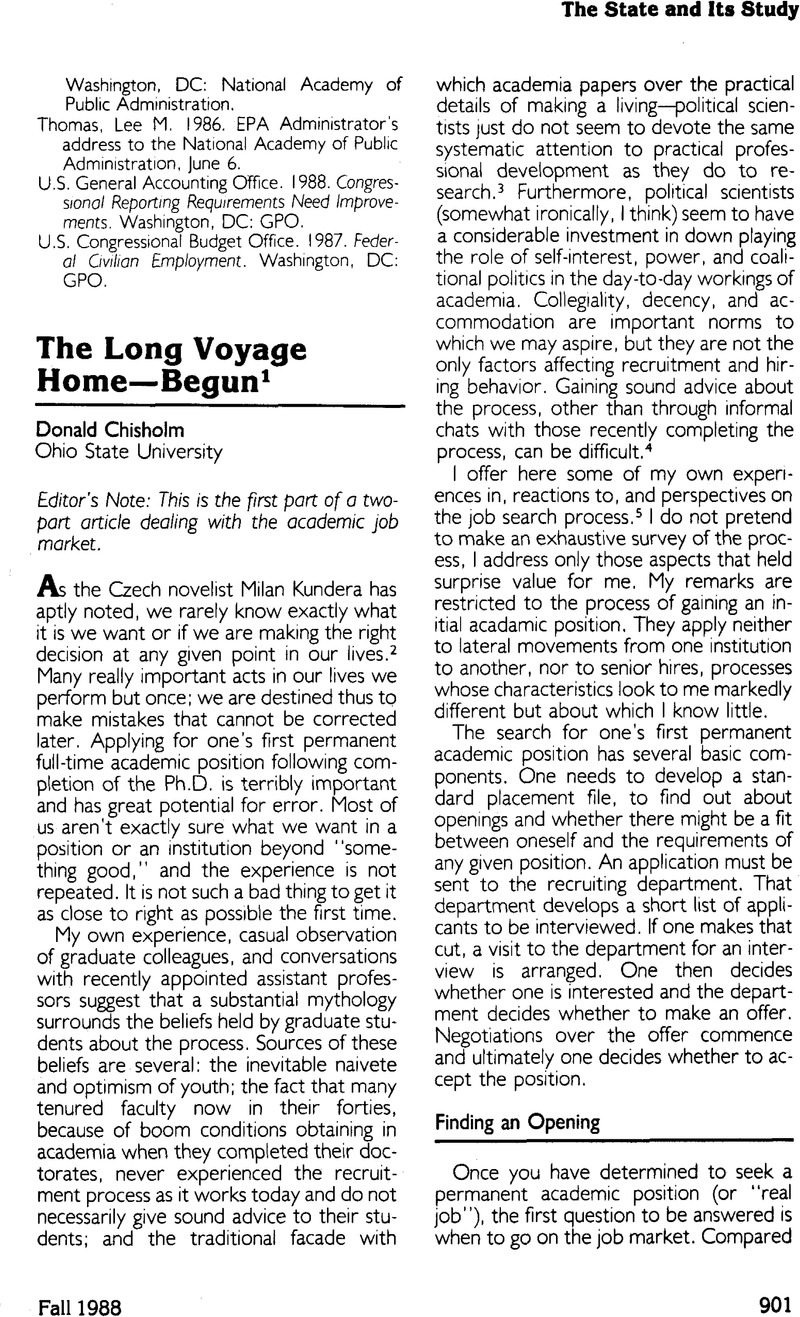No CrossRef data available.
Article contents
The Long Voyage Home—Begun1.
Published online by Cambridge University Press: 02 September 2013
Abstract

- Type
- News
- Information
- Copyright
- Copyright © The American Political Science Association 1988
Footnotes
I am indebted to Nelson Polsby and Kevin O'Brien, whose comments on an earlier draft added significantly to this essay.
References
Notes
2. See Kundera, Milan, The Unbearable Lightness of Being, translated by Heim, Michael Henry (New York: Harper and Row, 1984)Google Scholar.
3. For example, looking through back issues of PS I was able to find only one excellent, if brief, essay on finding a job. See Axelrod, Robert, “Tips for an Academic job Talk,” PS 18 (1985): 613 CrossRefGoogle Scholar.
4. I was extraordinarily fortunate to be in a graduate program which had not only a faculty member designated as placement officer (it was then alternately Nelson Polsby and Robert Kagan), but also a full-time placement coordinator, Lynn Gordon, who was more than simply a clearinghouse for paperwork. She provided both excellent advice and warm encouragement to the job candidates (and still does).
5. While my experiences may not be typical of those of every candidate, neither are they particularly unusual. They have at least the virtues of having been lengthy and recent. I sent out more than three dozen applications between Fall 1982 and Fall 1985. Ultimately, I interviewed with nine political science departments at institutions ranging from liberal arts colleges to state schools dominated by agriculture and engineering to large research universities. In the interim I taught in several temporary positions.
6. Against my advisor's judgment I sent off several first drafts of chapters with one application. On re-reading them a few months later it became immediately clear, if for no other reason, why I was not asked to interview at that department.
7. As opposed to one of those “completion” dates which seem to recede ever further into the future.
8. I once had a series of conversations with the chair of a department where I taught for a while about how to define a new position the department was planning to advertise. The chair was searching through other advertisements for the right words and couldn't come to closure because he just wasn't sure what it was he wanted.
9. This stage of the process is considerably compressed at the annual meeting of the APSA if one registers for the Personnel Service. This forum provides a valuable nexus between recruiting departments and job seekers. Its primary limitation is that it occurs very early in the annual interviewing season and many departments will not be represented.
10. It almost goes without saying that one's placement file should have letters of reference sufficiently current to reflect progress on the dissertation and recent research and teaching experience. This may require gentle but persistent requests of one's references to update the letters.
11. When you consider that a department might receive several hundred applications for one position, the problem of standing out from the crowd becomes clear.
12. For a more general discussion of their roles, see my “Reflections on the Dissertation Committee,” PS (Spring 1987): 257–61Google Scholar.
13. I was asked in one informal interview if I could teach a course on public personnel management. My candid answer that I had never thought about it apparently was not satisfactory. Later I spent a few weeks putting together a course on that topic in case I should ever be asked about it in the future. The issue never came up again. I guess it's kind of like keeping the tigers away.
14. Nelson Polsby puts it more simply: “Graduate students are always hungry.” (Polsby's Second Law).
15. Given the extremely small world of professional political science, the adage, “if you can't say something nice about someone, don't say anything at all,” is a good one to live by during interviews. One friend of mine, when queried about the work of a particular scholar, found himself launching into a detailed and scathing critique of its many deficiencies only to learn that that scholar had been the mentor of the person who asked the question.
16. One of my colleagues suggests that in interviews one is best advised to talk intellectual substance: the books and articles in the making in his home department.
17. Sometimes faculty have to expend considerable political capital to get a particular candidate in for an interview.
18. One usually meets one additional person: the dean of the college in which the department resides. While this meeting is largely perfunctory, one can learn about faculty benefits or ancient Egyptian irrigation methods, as I once did.


